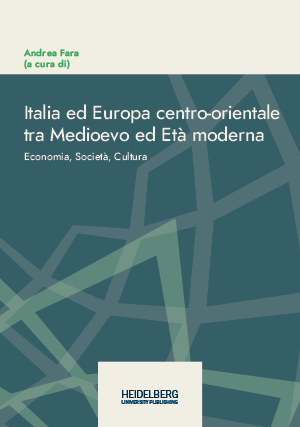Zitationsvorschlag
Lizenz (Kapitel)

Dieses Werk steht unter der Lizenz Creative Commons Namensnennung - Weitergabe unter gleichen Bedingungen 4.0 International.
Identifier (Buch)
Veröffentlicht
I protocolli notarili romani come fonte per l’Europa centroorientale
Alcuni sondaggi (1507–ca. 1511)
Abstract This contribution investigates the usefulness of Roman notarial sources for the history of Central and Eastern Europe. The notarial fund of the Sezione LXVI in the Archivio Storico Capitolino proves to be particularly rich. Its volumes 1–9 relating mainly to the years 1507 to 1511 are here surveyed, but the research could be extended at least even to the year of the Battle of Mohács (1526). For the four years indicated, there emerge about fifty names from which twentyone are immigrants from diverse backgrounds, and the others regard the Baltic countries (6), Poland (6), Silesia (diocese of Wroclaw) (4), Bohemia (2), Hungary (4) and Istria / Dalmatia (6). As additional Roman sources show, in particular about the composition of the Roman Curia, from these territories came many pilgrims, immigrants, and churchmen. There are many other details, especially regarding the careers of the ecclesiastics, but also about the life of individual immigrants, who were not rarely linked to the ‘national’ confraternities that offered their services to their compatriots in need and that were engaged in the construction of their own ‘national’ churches. It must be admitted, however, that until a complete inventory of Sezione LXVI and other related Roman notarial funds is carried out, it will be difficult to evaluate adequately the documents concerning the countries of Central and Eastern Europe, obviously less represented than the numerically stronger groups of Italians, Frenchmen, Spaniards, or those belonging to the countries of the RomanGerman Empire.






